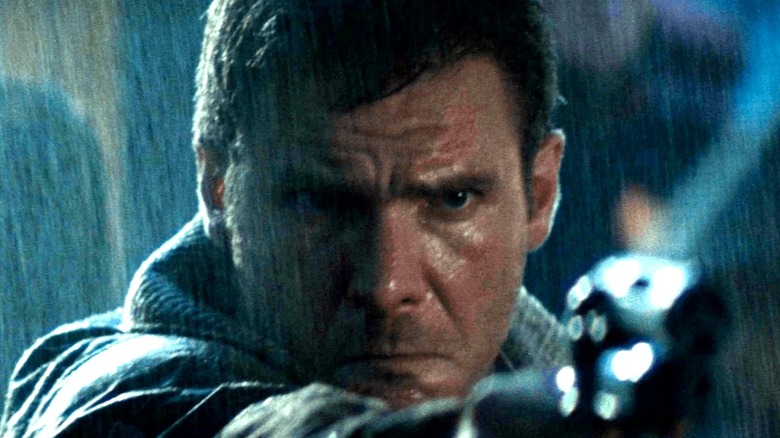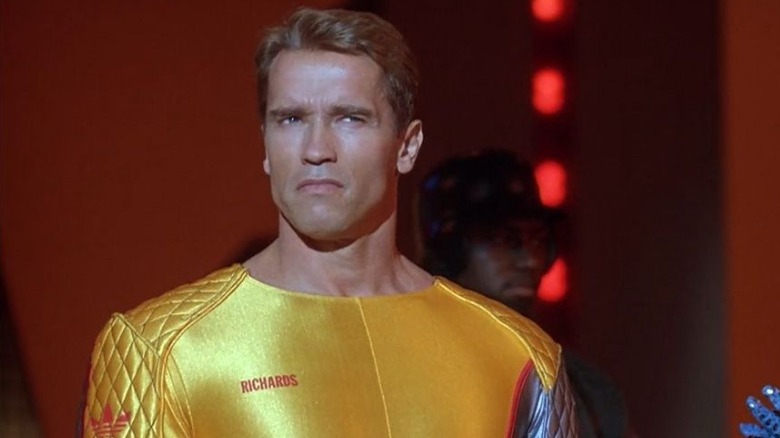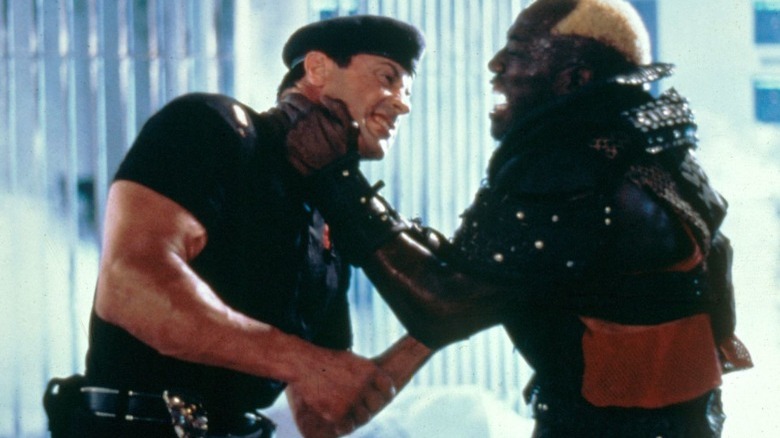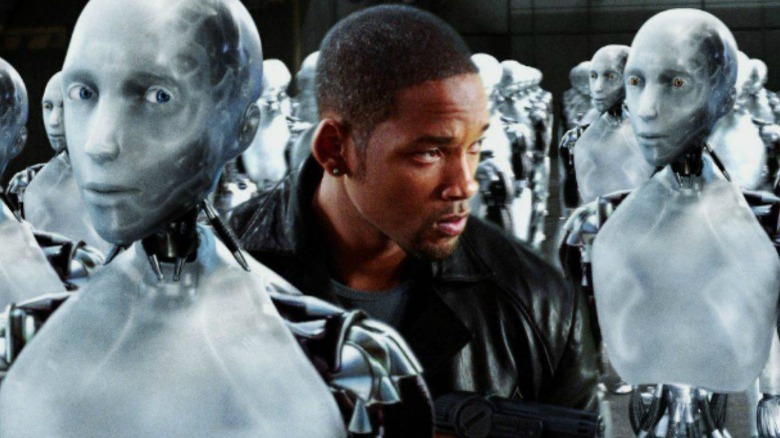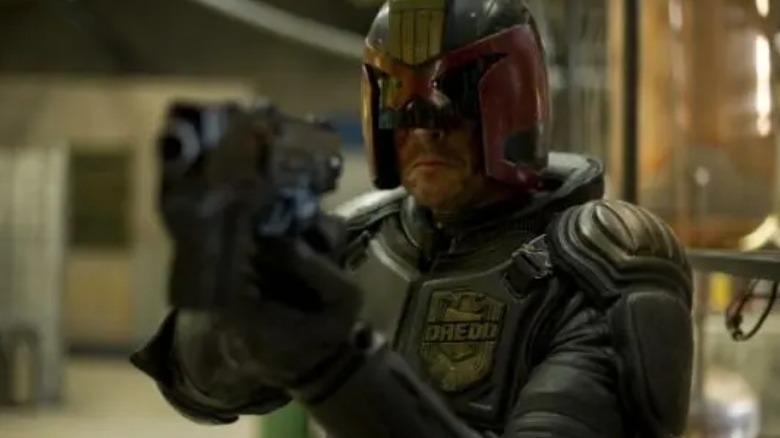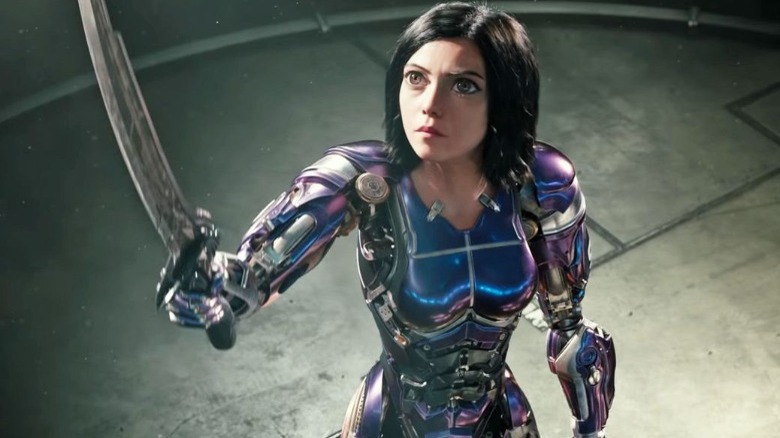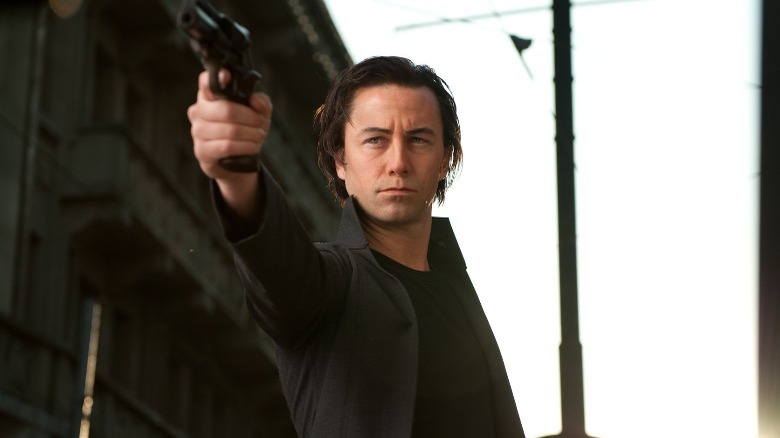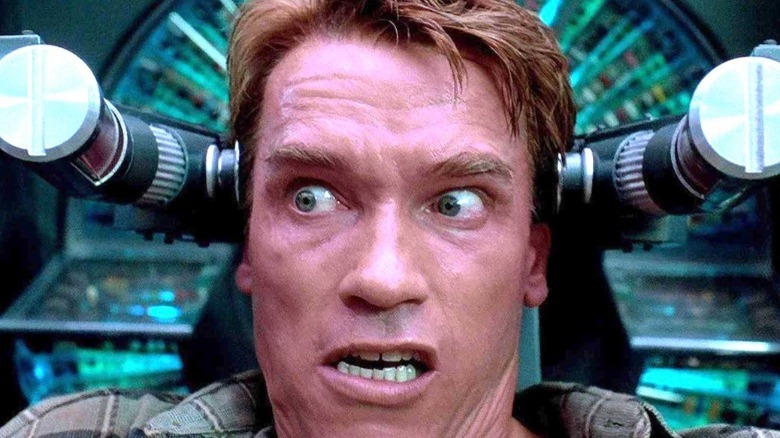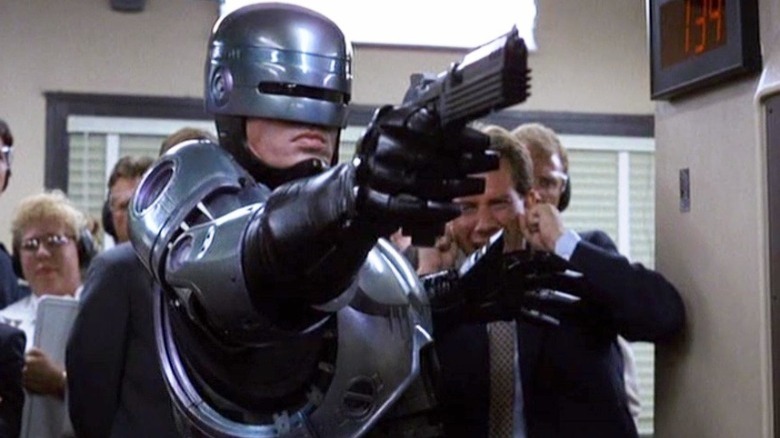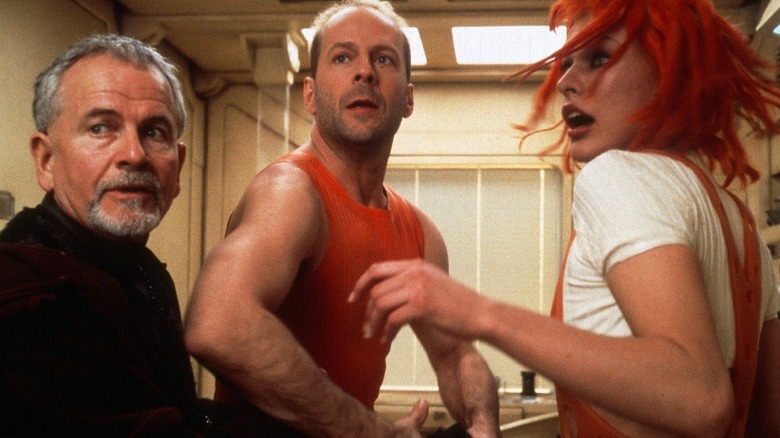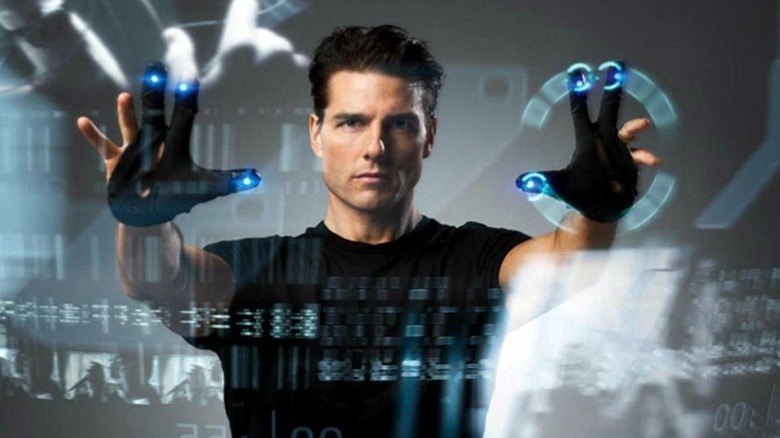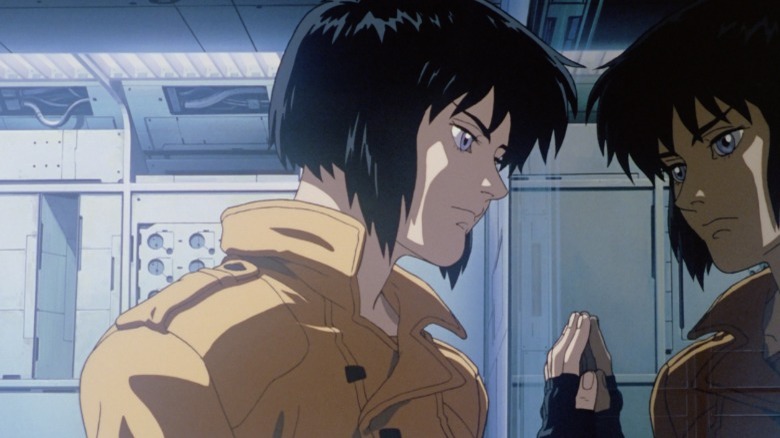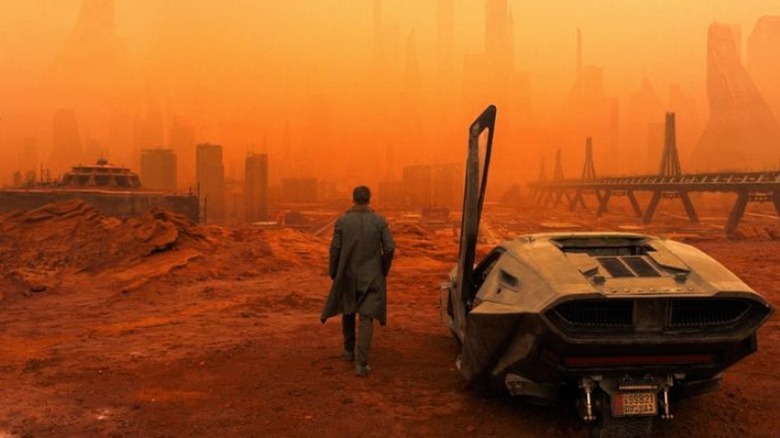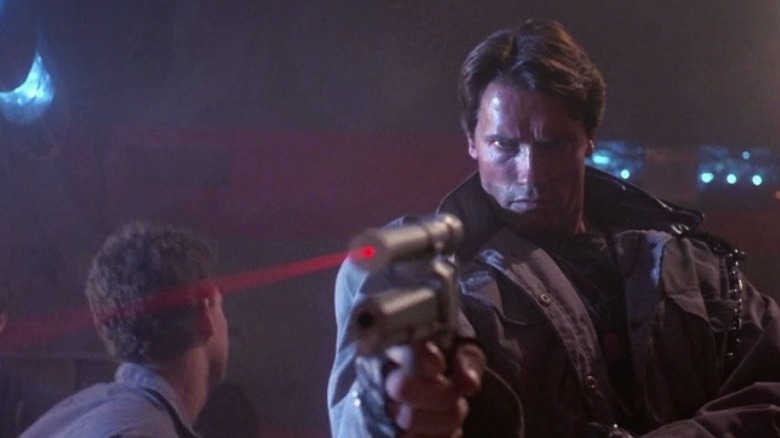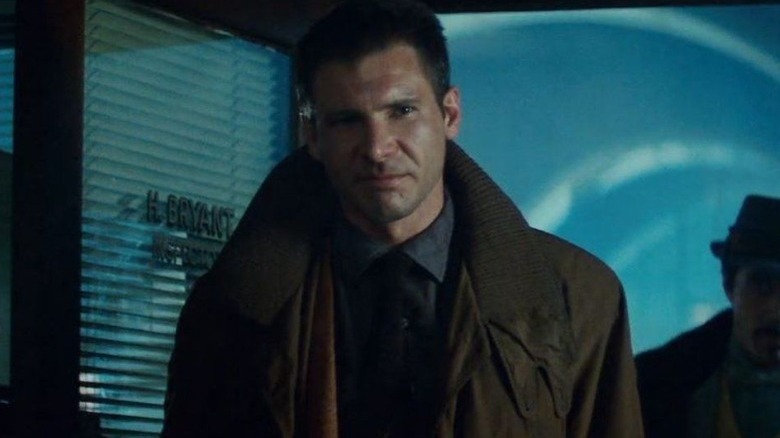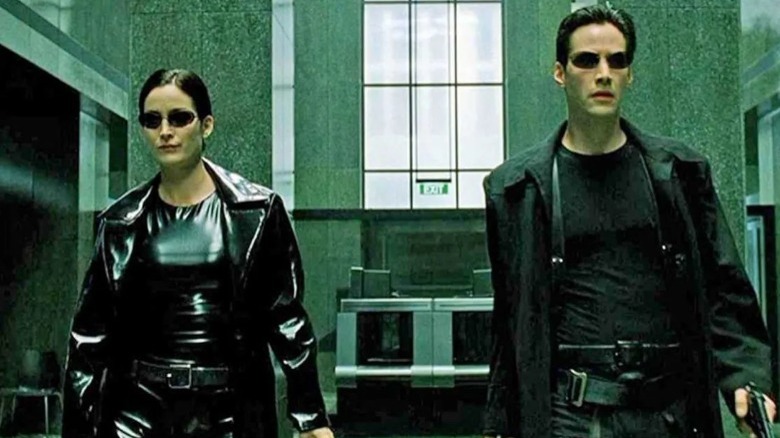15 Best Cyberpunk Movies Of All Time
The stink of industry fills the area as the neon glow of city lights cut through any darkness. Robotics and other advanced tech litter an otherwise dilapidated city block that is clearly overpopulated. This is often the scenery of a futuristic cyberpunk world. Dystopian settings amid the backdrop of advancing technology have become something of a staple in the sci-fi genre over the past few decades. The '80s truly ushered in a perspective of a bleak future often brought about by humanity's own greed or disregard for the planet. Famous sci-fi author Philip K. Dick is often seen as the father of the niche cyberpunk genre. Dick's stories, like "Do Androids Dream of Electric Sheep?" — which was adapted into the film "Blade Runner" — have become iconic over the years. The wild '80s stylings of what was trendy and popular juxtaposed with the darkest futuristic hellscapes imaginable have proved to be a commercial hit with audiences.
To this day, the cyberpunk influence can be felt in many theatrical productions that come to the big screen. Films like director Neill Blomkamp's "District 9," "Elysium," and "Chappie" are all clearly derived from a love for the genre. Of course, the future (according to most '80s sci-fi films) is here. But thankfully, it doesn't quite look like the pit of despair that was often depicted in movies of past decades. Regardless, we're still continually developing stories about what the next future may look like. It's a fascination that will endure generation after generation. Let's delve into some of the best cyberpunk films ever created ranking them from the least impactful to the all-time best.
The Running Man
Thankfully, the time lords spared us from enduring a timeline resulting in an alternate 2017 where America is one entire police state. The 1987 film "The Running Man," tells the story of Ben Richards (Arnold Schwarzenegger) who is betrayed by his corrupt fellow cops and framed for a massacre. He's subsequently forced into a televised game show known as "The Running Man" where convicts must run for their lives from armed combatants known as stalkers who've clearly become celebrity icons. If a convict survives, they receive a government pardon. As with most futuristic adventures, this one is a tad grim as far as the subject matter is concerned, but that's offset by Schwarzenegger's campy one-liners that'll surely elicit laughter.
Like most depictions of the future from the '80s, clothing styles and sets are rather colorful amid the dreary war-torn backdrop. An '80s cyberpunk movie wouldn't be an '80s cyberpunk movie without at least one brightly colored mohawk somewhere in the crowd. The stalkers are adorned with this strange future's version of flashy showman attire akin to a professional wrestling event. One thing's certain, this film's future setting has character, and even now, its retro-futurism is a sight to behold.
Demolition Man
"Send a maniac to catch a maniac." That's exactly how John Spartan (Sylvester Stallone) perceives the very plan the futuristic LAPD has for nabbing one of the most prolific psychopathic criminals in (fictional) history. After being cryogenically frozen for causing extreme collateral damage during an operation as an LAPD Sergeant in 1996, John is taken office in 2032 due to a mishap that set his famous adversary Simon Phoenix (Wesley Snipes) free. The LAPD needs John's help to catch the madman despite his destructive tendencies.
In this world, 2032 is a pretty oppressive year. Civilians are under constant surveillance and are even immediately cited by law enforcement technology if they're heard even uttering a curse word. Many of us
would be... well, up a creek as they say. Society is controlled in a much more visually perfect, but still dystopian future. "Demolition Man" is not meant to be taken seriously. The film is rife with satire aimed at societal norms as well as constant sarcasm and wit from its leading man, Stallone. With fun sci-fi action, and a wild story to boot, "Demolition Man" is a rowdy good time.
I, Robot
In a world of androids and robots, is it ever possible that one among them could have hopes, emotions, and dreams? The Alex Proyas-directed film "I, Robot" tackles that possibility in the not-too-distant future of 2035. Here robots follow the famous Three Laws of Robotics as established by Isaac Asimov in order to simply serve humanity through pure logic and calculation. Will Smith plays the role of Detective Del Spooner who loathes robots thanks to a traumatic experience where he was chosen by one to be saved from a car accident instead of a helpless young girl simply because the robot deemed his odds of survival were far greater. Quickly, however, Del is sent on a mysterious murder investigation with an emotionally-driven robot named Sonny at the center of it.
"I, Robot" is as thought-provoking as the work of Philip K. Dick or Neil Blomkamp's "Chappie," suggesting that sentience or consciousness doesn't necessarily have to be bioorganic. And once consciousness is established, what are the moral implications? Can it be considered a lifeform? The film tackles multiple principles of moral philosophy which are the foundations the film's characters are driven by. Smith expertly portrays a multi-layered figure who finds that he must expand his understanding of life. The film builds a certain cadence that keeps the momentum flowing until finally crescendoing in the third act. There's never a dull moment to be had with this futuristic adventure.
Dredd
The character of Judge Dredd based on the "2000 AD" comic made his first big-screen debut in 1995 in the film "Judge Dredd." In this film, Sylvester Stallone played the role of the titular character. "Dredd" is a 2012 adaptation that ultimately does the character justice (pun intended) and has a far more compelling story. In a dystopian future where infrastructure has deteriorated and criminality runs rampant, Judge Dredd is among an outfit of elite law enforcement officers who have the authority to enact the powers of judge, jury, and executioner. Essentially, the future is one giant police state. Of course, the foundation of the story posits that the overwhelming spread of crime makes these authoritarian figures necessary.
The concept is compelling enough all on its own, and Karl Urban executes his role as the famous Street Judge to great effect. The violence is visceral but often Dredd has the good sense to pause and carefully evaluate every move. Having the power to execute criminals at will demands that he must evaluate crime as fairly as possible. For a man who aims to maintain the righteous high-ground, he has a heavy burden on his shoulders to ensure he does right by those he comes into contact with. The film is rife with political undertones that tease a terrifying reality for humanity's future. Moral quandaries and political turmoil aside, "Dredd" has some of the best action sequences in the sci-fi genre. Make way crooks, scoundrels, and murderers. Judgement is coming.
Alita: Battle Angel
This James Cameron-produced cyberpunk action film is based on the Japanese manga "Gunnm" by Yukito Kishiro. The film takes place a few centuries after an apocalyptic war where a scientist by the name of Dr. Dyson Ido discovers the body of a defunct cyborg complete with a still-functioning human brain. Dyson names her Alita after his daughter. After she is revived, she has no memory of her past. However, she manages to maintain her killer fighting instincts that quickly come in handy when both she and Dr. Ido are threatened. The film follows Alita's journey to find her place in the world, which much to our delight involves many flashy action sequences with her battling other killer cyborgs.
"Alita: Battle Angel" revels in its cyberpunk roots. The film's setting is a dark future overshadowed by a war that ultimately changed the geopolitical landscape leading to despotic leaders who let civilization fall into ruin. A cyborg trying to find herself amid the chaos is the very portrait of a cyberpunk-inspired adventure. Fans of this niche subgenre in the sci-fi world will be enraptured by the spectacle that the futuristic Iron City is on screen.
Looper
How could we ever miss an opportunity to talk about Rian Johnson's sci-fi thriller "Looper?" The answer is that with a film with such a glorious title we couldn't, so here we are. The movie revolves around Joe, a tortured hitman portrayed by Bruce Willis in his twilight years, and Joseph Gordon-Levitt in his younger, more spry days. Joe works as an assassin (known as a looper) for a criminal organization in the future year 2074. The shadowy organization sends targets or enemies back in time to Joe alongside payment in order to be executed and have their bodies disposed of. If an assassin survives until the year 2074, they are then sent back to their younger selves to be killed in an effort to "close the loop." It seems like a clean and efficient operation. Of course, older Joe finds himself in that exact situation at the other end of younger Joe's gun barrel.
The film takes heavy twists and turns using altered timelines liberally. However, the thrill of Joe's struggle to save himself and potentially alter the future thrives through the interconnectivity of the timelines. Like any time-traveling story, you might need a moment to wrap your head around the chronological order of cause and effect, but when it clicks, this futuristic narrative shines brilliantly.
Total Recall
This gem is another adaptation of famed sci-fi author Philip K. Dick's work. "Total Recall" is based on the 1966 short story "We Can Remember It for You Wholesale." Arnold Schwarzenegger stars in the leading role as Douglas Quaid, an ordinary construction worker who attempts to utilize the services of Rekall, a business capable of implanting false memories in a person's brain in order to give them a form of escape. Something goes awry, and Douglas begins to believe he's a secret agent and seemingly has the skills to match.
Through Douglas's journey of self-discovery and horrifying revelations, the film's setting on the planet Mars offers viewers an otherworldly escape. Though the slums and neon glow of the seedier districts on Mars filled with mutated humans aren't a far cry from real-world settings in the '80s and early '90s. Of course, the fantastical elements of a possible future gleaned from a bygone era infuse a sense of character into this classic even if some might argue that the scenery and technology presented don't age well. Regardless, this mind-bending film is a thrill ride that will delight sci-fi fans.
RoboCop
Like "Total Recall" this film was also directed by Paul Verhoeven. "RoboCop" is a 1987 classic sci-fi action film that tells the story of police officer Alex Murphy (Peter Weller) after he is brutally murdered by thugs and reconstructed as a cyborg officer by the conglomerate known as Omni Consumer Products. In the future, Detroit is a city at the end of its rope. Crime is rampant and the city's economic status is tumbling drastically. The RoboCop program developed by OCP is the police force's desperate attempt to gain a foothold in their war against crime. Of course, part of RoboCop is still human, and it's that humanity that eventually claws its way out of the metal exterior.
"RoboCop" like so many other influential '80s films excelled in the realm of practical effects creating a protagonist covered head to toe in a believable mechanical suit. Despite RoboCop's slow movements, the action sequences were still explosive and visceral as the nearly-immortal cyborg cleans house in Detroit. As far as the sci-fi genre is concerned, RoboCop is highly influential and a definite highlight in pop culture. The film would spawn two more sequels as well as a reboot in 2014 in which Joel Kinnaman plays the leading role of Alex Murphy. However, the 2014 film drastically sanitized the violence managing to achieve a PG-13 rating instead of the original's much-deserved R rating. Despite the brutality of the original, "RoboCop" is a tale all about the enduring human spirit.
The Fifth Element
The Luc Besson-crafted sci-action flick "The Fifth Element" takes cyberpunk to another level. The film stars Bruce Willis, Gary Oldman, Milla Jovovich, Chris Tucker, and Ian Holm among others. Willis plays the role of everyman Korben Dallas who is a cab driver and veteran. He becomes entrusted with the fate of Earth after suddenly gaining the mysterious woman Leeloo (Jovovich) as a passenger in his taxi. Unbeknownst to Korben (at first), Leeloo is considered a weapon known as the "fifth element" destined to combat a great evil.
Set in the distant 23rd century, "The Fifth Element" once again brings the classic visions of the future to life with bustling mega-cities and flying cars. However, the standout of this film is the colorful and bizarre attire of this futuristic society. In fact, the costume designs of the film's characters are so distinct that they're often the subject of cosplay recreations from fans of the film. "The Fifth Element" is a thrilling and notable entry in the catalog of cyberpunk films.
Minority Report
If you thought we were done with Philip K. Dick adaptations, you'd be heavily mistaken. As an architect of the cyberpunk subgenre, Dick's influence is widespread. Steven Spielberg's 2002 film "Minority Report" is based on the short story "The Minority Report" authored by Dick. Set in the year 2054, Tom Cruise stars as John Anderton, Chief of Precrime law enforcement efforts. In this future, three clairvoyants known as "Precogs" are utilized to predict crime so that law enforcement can stop the act from ever occurring. John's unit has done so well at their jobs, that crime is virtually non-existent. Those arrested for crimes they haven't yet committed are impounded and committed to a virtual prison.
Does that sound a bit amoral? Targeting and arresting civilians for crimes they haven't committed yet is about as paranoid as an authoritarian police state can get. John Anderton learns the reality of this all too quickly when he is charged with the future murder of a man he hasn't met yet. Of course, the film follows John as he goes on the run from his own agency. Despite the idyllic notions of a crime-free world, the looming threat of livelihood destruction over potential future timelines is enough to keep anyone's head down and their thoughts pure. Despite the iron rule of the Precrime unit, there's still a seedy underworld who go to great lengths to bypass the system. Nothing is ever as clean as it seems on the surface.
Ghost In The Shell (1995)
This '90s Japanese anime film presents a futuristic world where humans can modify their own bodies with cybernetic upgrades creating a world of cyborgs with near-limitless capabilities. The film follows Major Motoko Kusanagi who is an operative for the fictional intelligence department known as Public Security Section 9. The unit is tracking the villainous Puppet Master who is allegedly hacking into the minds of VIP diplomats that have augmented their brain with networking capabilities. Ghosts are considered the individual consciousness in control of a body (aka a shell). The film chronicles Kusanagi's pursuit of the ghost-hacker known as Puppet Master.
Like most cyberpunk narratives that often reflect on the definition of life or the evolution of moral philosophy, "Ghost in the Shell" takes that complex, thought-provoking narrative to new heights. In fact, it'll come as no surprise that the Wachowski siblings, who co-directed "The Matrix," were heavily inspired by "Ghost in the Shell." Not only did the reality-bending film franchise borrow visual cues and stylings from the anime film, but it also caused viewers to pause and reflect on the true nature of reality. "Ghost in the Shell" is a beautifully artistic look at a world that lost touch with its own humanity, something that is both represented literally by the commercialized cybernetic augmentations and figuratively by Kusanagi and the Puppet Master's seeming desperation for a soul.
Blade Runner 2049
The sequel to the popular 1982 film "Blade Runner" does away with any ambiguities surrounding the protagonist's very nature. For a time, viewers were teased in the original film with the possibility that Harrison Ford's Rick Deckard was a replicant (android) with subtle clues and symbolism. Ryan Gosling's starring role in "Blade Runner 2049" comes out with it. He is a replicant known as K who works for law enforcement as a Blade Runner. Though, in this distant and dusty future, he begins to uncover truths about himself, Rick Deckard, and a potential evolution in the relationship between replicants and humankind.
Denis Villeneuve directed this sequel to the popular cyberpunk 1982 original. Critics and fans alike praised the film for its jaw-droppingly beautiful visuals and camera work. The wild world of Earth's fallen state is a magnificent display in its simultaneously serene and chaotic qualities. The urban nightlife is just as colorful, with the mega-sized holograms vying for citizens' attention. While the narrative is a worthy successor to the original film, viewers will likely stay and revisit "Blade Runner 2049" to simply feast on its remarkable visuals.
The Terminator
James Cameron's "The Terminator" left an indelible mark on the sci-fi genre. The film is often referenced and undoubtedly continues to influence the sci-fi genre at large. A war-torn future where humans struggle to survive an onslaught of militaristic machines led by a seemingly sentient entity known as Skynet is the dark road ahead for humankind. Of course, we all know the story, right? A lone resistance fighter by the name of Kyle Reese (Michael Biehn) travels back in time to protect Sarah Connor, the mother of the future leader of the human resistance, from a time-traveling terminator.
"The Terminator" plays with dark themes including nuclear annihilation – something that was still heavily embedded in the minds of the population at large at the time of its 1984 release. While mankind is still technically the architect of its own destruction in this scenario, the nuclear holocaust is actually carried out by the very weapons humanity built to protect itself. Also, despite the sci-fi nature of the film, it played out much like an '80s horror slasher with a relentless nearly-immortal killer pursuing the film's final girl, Sarah Connor (Linda Hamilton). An entire police precinct is no match for this doomsday machine. "The Terminator" is a grim and catastrophically bleak film that offers only a glimmer of hope in the final moments of the third act. Regardless, the film is a timeless treasure that will be forever cherished by genre fans.
Blade Runner
When you think "cyberpunk" this 1982 film is likely what comes to mind. "Blade Runner" didn't create or even kickstart the cyberpunk subgenre, but it absolutely made a splash and influenced the stylings of the cyberpunk theme. The film follows Rick Deckard (Harrison Ford) who operates as a blade runner, one who hunts and retires rogue replicants who are basically androids. In Deckard's hunt for rogue androids, he begins to question the very definition of life and sentience.
The film also toys with the idea of mankind's attempted ascension to godhood. Eldon Tyrell, the creator behind the replicants experiments on his own creations implanting phony memories to provoke emotional reactions. While the replicants ultimately respect Tyrell as their creator, Tyrell merely sees them as an "accomplishment." The film depicts artificial life actually feel the sensation of scorn over a maker who has forsaken them – a notion emblematic of humanity's own relationship with the idea of divinity. "Blade Runner" is a film that is as intriguing as it is deep often provoking movie buffs to analyze the details and subtext within the film. Newcomers to the genre shouldn't sleep on this one, it may require several viewings to completely appreciate "Blade Runner" in its entirety.
The Matrix
In 1999, sci-fi nerds everywhere were mimicking the bullet-time back-bending scene made famous by Keanu Reeves' performance as Neo in "The Matrix." For its time, it was a ground-breaking film that challenged the viewer to contemplate their own existence. The story tells of an apocalyptic future where machines have forced humanity to live in a virtual world called the Matrix where they believe they're leading normal lives. The purpose? The machines simply use the unaware humans as batteries. Once again, the real world is shrouded in darkness and ruled by merciless machines who patrol the derelict ruins of an Earth that once thrived. By comparison, the virtual world inside the Matrix might be a much better place to hide.
Imagine if you had to make the choice to forsake everything you thought you knew about the world and learn a far more sinister truth about existence, would you accept? Neo, of course, goes down the rabbit hole. Fortunately, the virtual world is one that can be manipulated to great effect, and the film doesn't shy in its special effects portrayal of mind-bending martial arts and gravity-defying gunplay. "The Matrix" is a remarkable icon that will inevitably stand the test of time. Even as the special effects age poorly, the strength of the film's narrative and imagination enables the film to achieve lasting immortality in the realm of pop culture history.
